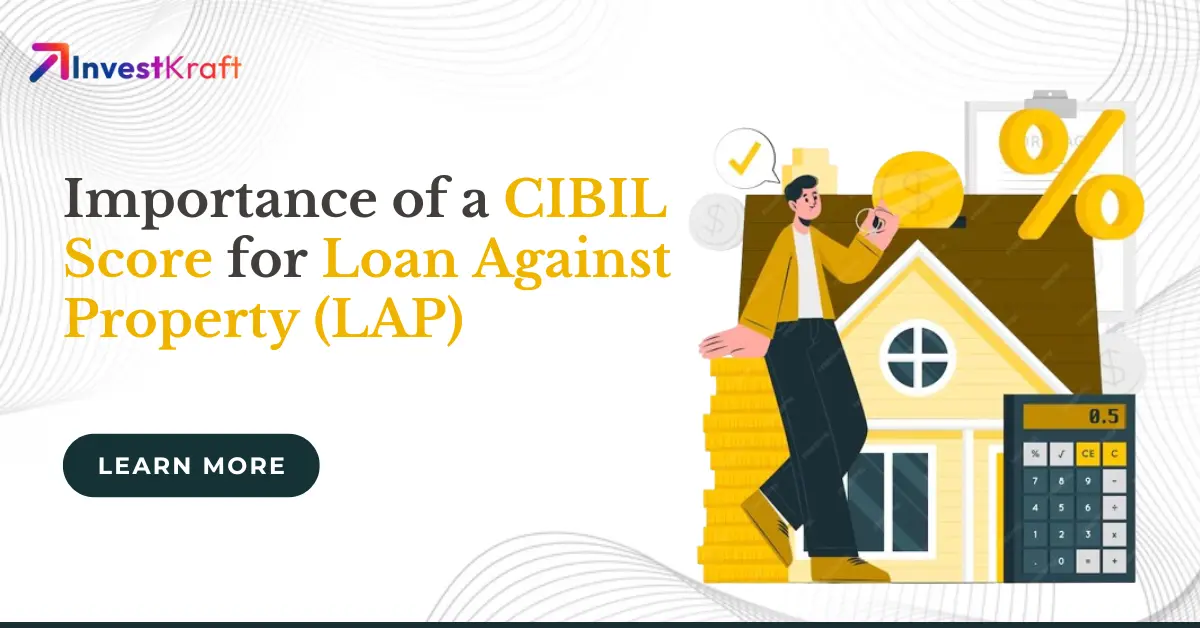Loan Against Property: Does Your CIBIL Score Meet the Cut?

In India, understanding your CIBIL score is crucial if you have taken out consumer loans, credit cards, personal loans or loans against property. The score, which ranges from 300 to 900, is calculated by the Credit Information Bureau India Limited or CIBIL and serves as a creditworthiness measure. Although banks may not have set strict criteria, having a CIBIL score of 750 or above can significantly simplify the loan approval process.
For loans against property, having a minimum CIBIL score is important to be eligible. Here, we will discuss the minimum CIBIL score for a loan against property and its impact on your eligibility.
What is Meant by Loan Against Property (LAP)?
Loan against property (LAP) is a secured loan that banks offer by taking the borrower’s property as collateral. This property can be residential, commercial or even land. The loan amount is determined by the property’s market value.
When applying for a loan against property, it is important to consider the various reasons for needing the funds, ranging from personal events like weddings or education expenses to business expansion. In addition to the property value, factors like payment history, income, savings and the stability of employment or business are important considerations for the bank.
Importance of CIBIL Score in Loan Against Property
A high CIBIL score is important for financial institutions to evaluate your creditworthiness. It impacts your loan and credit card applications, as well as interest rates and approval limits. Having a low score or being a CIBIL defaulter may lead to loan rejection, while a high score increases the chances of approval. In addition, individuals with high CIBIL scores have better chances of negotiating lower interest rates and obtaining higher loan amounts.
Is It Mandatory to Have a Good CIBIL Score for a Loan Against Property?
Yes, to secure a loan against property, having a good CIBIL score is important. Lending institutions generally accept scores above 650, although a score above 800 is considered excellent. However, a low score can lead to drawbacks like lower loan amounts, higher interest rates, longer processing time, higher processing charges and limited options with higher chances of rejection. Therefore, ensuring a minimum CIBIL score is crucial when applying for a loan against property.
What is the Minimum CIBIL Score That is Required for a Loan Against Property?
Different lenders have varying requirements for the CIBIL score needed to qualify for a loan against property, While some lenders may stipulate a minimum score of 700, others could be more lenient and may consider scores below 700 if the borrower has other positive aspects, such as stable income and a good debt-to-income ratio.
Even though a high CIBIL score can improve your chances of getting a loan approved, it is not a guarantee. It is always best to talk to different leaders to find out their specific CIBIL score criteria.
What Impact Does a High CIBIL Score Have on LAP?
Having a high credit score, typically above 700 or 720, means that lenders perceive you as less risky when it comes to borrowing. This perception is based on the belief that you are more likely to repay debts promptly or completely. Consequently, lenders tend to provide you with better loan terms, such as lower interest rates, on various financial products like mortgages, loans and credit cards.
Additionally, along with a high CIBIL score, you must not have done the following previously otherwise your loan application might get rejected.
- Lenders hesitate to give loans to borrowers with multiple loans, fearing increased debt and defaults. Frequent borrowing affects credit reports and scores. Even if loans are repaid on time, lenders see it as risky and decline loan requests.
- Defaulting on a loan affects the borrower and guarantor’s credit. Being a guarantor for a defaulted loan can impact your credit report and affect your ability to get a loan. It is important to assess the borrower’s repayment capability before becoming a guarantor.
- Ignoring comments on your CIBIL report can lead to loan rejection, in addition to a low CIBIL score. Lenders pay attention to any observations in the report, like settling the loan differently or paying EMIs late.
- Instability in any form (job hopping, salary, organization, permanent address) can damage your CIBIL credit report and negatively affect loan applications. Lenders avoid borrowers with an unstable nature.
- Banks and other financial institutions use your payment and credit information, including personal details, to assess loan applications. If any of these details match a defaulter’s, your loan application might be rejected, even with a good CIBIL score. Sometimes, even the borrower’s address can affect the decision.
- Loan applications with sisters or friends are usually rejected. Joint loans with brothers or parents are usually approved by lenders.
- Lenders prefer regular income tax return filings for loan applicants to verify information.
- Previous loan rejections remain on CIBIL and can affect future loan applications.
- Check the co-applicant’s CIBIL record before borrowing a loan together. Poor record increases the chances of loan rejection.
- Maintain a balance between secured and unsecured loans in your portfolio. Secured loans require collateral, while unsecured loans don’t. Lenders may reject your application if you have too many unsecured loans, regardless of your good credit score.
- Applying for multiple loans at the same time or submitting the same loan application to various lenders will result in being labelled a frequent inquirer by CIBIL. This can lead to loan rejection, even with a good CIBIL score.
- Borrower’s savings can help lender review financial profile. No savings portfolio may result in a loan rejection.
- If lenders cannot verify a borrower’s key credential information, the loan application may be rejected regardless of credit history.
How to Build a Strong CIBIL for a Successful Loan Against Property Application?
Building a strong CIBIL score is essential for getting approved for a loan against property (LAP) on favourable terms. To increase your chances of approval, you can take certain steps. These include -
- Make Timely Payments: It is key to a good CIBIL score. Pay on time for all credit obligations, including cards, loans and bills. Late payments hurt your score, so use reminders or auto-pay.
- Maintain a Low Credit Utilization Ratio: Keep credit utilization below 30% of the limit to improve CIBIL score.
- Build a Healthy Credit Mix: Have both secured and unsecured loans to show you can handle different types of credit. If you have no credit history, get a secured credit card with a low limit and use it responsibly to build your score.
- Check and Dispute Errors in Your CIBIL Report: Regularly check your CIBIL report to identify errors. Dispute and rectify any mistakes with CIBIL promptly.
- Avoid Multiple Loan Inquiries in a Short Period: Limit loan inquiries to prevent a negative impact on credit score. Plan applications and research lenders in advance for fewer inquiries.
- Maintain a Long Credit History: Keep a long credit history with good repayment. Do not close old cards with fees or high rates.
- Be a Guarantor Cautiously: Think twice before being a loan guarantor to avoid a negative impact on your credit score.
Conclusion
Understanding your CIBIL score is crucial for building a strong credit profile and ensuring a smoother loan against property experience in India. A high CIBIL score gives you the leverage to negotiate better loan terms and helps in achieving your financial goals. By following these steps, you can improve your credit score and enhance your borrowing potential.
Frequently Asked Questions (FAQs)
Q: What is a CIBIL Score and Why Does it Matter for LAP?
A: Your CIBIL score is important as it reflects your creditworthiness. Lenders use this score to evaluate your ability to repay loans. A higher score reduces the risk of delay in payments. A good CIBIL score improves your chances of getting approved for a loan and may lead to lower interest rates.
Q: What is the Minimum CIBIL Score Required for LAP?
A: The minimum CIBIL score required for a loan against property can differ from one lender to another. However, most lenders consider a CIBIL score of 700 or above as the benchmark for LAP eligibility. It is important to check with the specific lender to understand their exact requirements for LAP approval.
Q: I Don't Have a High CIBIL Score. Can I Still Get LAP?
A: It is possible to obtain a LAP with a lower CIBIL score but it may come with stricter loan conditions like a higher down payment or shorter repayment term. This could result in less favourable interest rates and ultimately increase the overall cost of the loan.
Q: Is it Better to Choose a Fixed or Floating Interest Rate for LAP?
A: Your decision to choose between a fixed or floating interest rate should be based on your risk tolerance and market expectations. Opting for a fixed interest rate provides stability as your interest rate remains constant throughout the loan term, offering predictability. On the other hand, a floating rate may initially offer a lower rate, but it is subject to market fluctuations, which can lead to higher payments in the future.
Q: Can a Co-applicant with a High CIBIL Score Help My LAP Application?
A: Yes, having a co-applicant with a high CIBIL score can greatly increase your chances of getting approved for a loan against property (LAP), especially if your score is not as strong. Additionally, the income of the co-applicant can also be taken into account, which could help you qualify for a larger loan amount.
Q: What if I Have Multiple CIBIL Scores from Different Bureaus?
A: It is important to note that besides CIBIL, there are other credit bureaus in India such as Equifax and Experian. Although the CIBIL score is the primary consideration for lenders, they may also take into account reports from other bureaus. Therefore, it is crucial to ensure a positive credit history across all bureaus to maintain overall financial well-being.
Q: I am a Self-Employed Individual. How Does LAP Eligibility Work for Me?
A: Self-employed individuals may be eligible for LAP, although the application process may entail increased scrutiny. Lenders might request thorough documentation to confirm the stability of your income, such as tax returns, bank statements showing business income and evidence of business ownership.
Q: Can I Use LAP Funds for Anything, or Are There Restrictions?
A: When using LAP funds, it is important to be aware of any limitations set by the lender. Make sure to consult with the lender to confirm what you can and cannot use the funds for. Generally, LAP funds can be used for purposes such as business expansion, debt consolidation, medical emergencies or financing education.
Q: Should I Consider a Loan Counselor When Applying for LAP?
A: Using a free loan counselling service such as the one offered by Investkraft can be helpful, especially if you have a complicated financial situation or a lower CIBIL score. They can assist you with the LAP application, compare different loan options and make sure you fully comprehend the terms and conditions before committing to a loan.

Author: Abhik Das
Abhik Das is a versatile content writer with over 5 years of experience crafting engaging and informative content across diverse industries. His expertise spans the fields of ed-tech, pharmaceuticals, organic food, travel, sports, and finance.
Here's what sets Abhik apart:
Content Versatility: Able to adapt writing style and tone to suit various audiences and content needs.
SEO Proficiency: Creates content optimized for search engines, ensuring discoverability and organic traffic.
Deep Research: Conducts thorough research to ensure content accuracy and credibility across complex topics.
Engaging Storytelling: Captures reader interest with clear, concise, and compelling writing.
Abhik's diverse background empowers him to deliver insightful content across a wide range of subjects. Whether you're seeking engaging explainer pieces on the latest financial trends, informative guides to organic food choices, or captivating travelogues, Abhik has the expertise to craft content that resonates with your audience.









.webp)




.webp)




